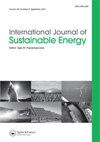绿色经济学的挂毯:描绘二氧化碳排放、经济增长和可再生能源之间的关系
IF 2.7
Q4 ENERGY & FUELS
引用次数: 0
摘要
本研究考察了1995-2020年间37个经合组织国家的二氧化碳排放、GDP、可再生能源消费和贸易开放之间的关系。采用面板向量自回归(PVAR)模型和格兰杰因果检验,探讨了这些因素之间的因果关系。主要研究结果表明,GDP、可再生能源和贸易开放程度与二氧化碳排放之间存在显著的因果关系。具体而言,可再生能源消费和贸易开放的滞后显著降低了二氧化碳排放。令人惊讶的是,GDP对二氧化碳排放的影响被发现可以忽略不计,这挑战了将经济增长与环境退化联系起来的典型观点。这些见解对环境治理和气候融资方面的政策制定者具有重要价值。这些数据强调了促进可再生能源和贸易开放对有效减少二氧化碳的重要性。该研究提倡可持续的环境治理模式,强调强有力的法律结构和执行的明确性。由于GDP对二氧化碳排放没有显著影响,因此有可能转向可持续的经济增长模式。这项研究提供了一个基本的实证基础,表明扩大未来的研究,包括不同的变量可能会产生一个更全面的理解所讨论的关系。本文章由计算机程序翻译,如有差异,请以英文原文为准。
The tapestry of green economics: mapping the nexus of CO2 emissions, economic growth, and renewable energy
This study examines the relationships between CO2 emissions, GDP, renewable energy consumption, and trade openness across 37 OECD countries from 1995–2020. Using a Panel Vector Autoregressive (PVAR) model and Granger Causality tests, the research probes the causality among these factors. Key findings show a notable causality from GDP, renewable energy, and trade openness to CO2 emissions. Specifically, lags in renewable energy consumption and trade openness significantly decrease CO2 emissions. Surprisingly, GDP's influence on CO2 emissions is found to be negligible, challenging the typical belief linking economic growth to environmental degradation. These insights hold great value for policymakers in environmental governance and climate finance. The data underscores the importance of promoting renewable energy and trade openness for effective CO2 reduction. The study advocates a sustainable environmental governance model, emphasizing strong legal structures and clarity in execution. Since GDP doesn't significantly impact CO2 emissions, there's potential to pivot towards sustainable economic growth models. The research offers a foundational empirical groundwork, suggesting that expanding future studies to include diverse variables might yield a more comprehensive understanding of the relationships in question.
求助全文
通过发布文献求助,成功后即可免费获取论文全文。
去求助
来源期刊

International Journal of Sustainable Energy
ENERGY & FUELS-
CiteScore
5.70
自引率
3.20%
发文量
52
期刊介绍:
Engineering and sustainable development are intrinsically linked. All capital plant and every consumable product depends on an engineering input through design, manufacture and operation, if not for the product itself then for the equipment required to process and transport the raw materials and the final product. Many aspects of sustainable development depend directly on appropriate and timely actions by engineers. Engineering is an extended process of analysis, synthesis, evaluation and execution and, therefore, it is argued that engineers must be involved from the outset of any proposal to develop sustainable solutions. Engineering embraces many disciplines and truly sustainable solutions are usually inter-disciplinary in nature.
 求助内容:
求助内容: 应助结果提醒方式:
应助结果提醒方式:


